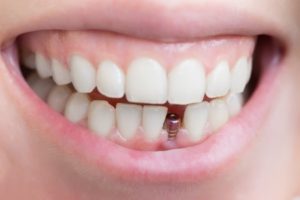 Dental implants are becoming more and more common, but they aren’t necessarily for everyone. Patients with osteoporosis may require the dentist to take additional or alternative means of treatment. Here’s what you need to know about dental implants if you have osteoporosis.
Dental implants are becoming more and more common, but they aren’t necessarily for everyone. Patients with osteoporosis may require the dentist to take additional or alternative means of treatment. Here’s what you need to know about dental implants if you have osteoporosis.
How Dental Implants Work
Dental implants are embedded into the jaw bone. In order for the implant to stay in place indefinitely, the bone must remodel around the implant, growing into it and holding it firmly in place. This process is called osseointegration. If you have issues with your jaw bone, you may not be able to get implants.
What Osteoporosis Does
Osteoporosis is a systemic condition in which the bones become incredibly weak over time. If osteoporosis has advanced far enough to reduce the strength of the jawbone, dental implants may not be possible.
How Osteoporosis Affects Implants
Osteoporosis can affect implants before, during, or after the procedure. Before the procedure, the dentist may need to take precautions to strengthen the bed for the implant. If that is not possible, alternative treatments may be discussed. During the process, the implant may not take root in the jaw, causing it to have a risk of becoming loose. In these situations the dentist must decide whether to take additional measures to keep the implant or remove it.
If you develop osteoporosis after getting dental implants, the bone loss could affect your jaw and the stability of the implant.
If you have osteoporosis, it is very important that you tell your dentist when you first start care or treatment. It will likely change the course of treatment completely, or it may require additional measures. Our dentists are familiar with osteoporosis and can make the right treatment decisions for you.
